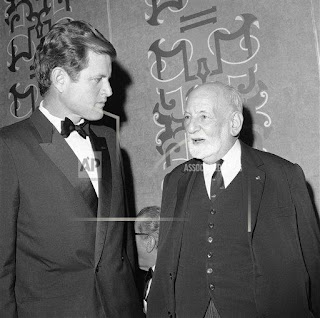Senator Edward Kennedy chats with Rene Cassin, Nobel Peace Prize winner, at a dinner of the International League for the Right of Man at the New York Hilton Hotel on December 6, 1968. In an address before the league which marked its 25th anniversary, Kennedy called for massive American assistance to the starving Biafrans. He said President Lyndon Johnson should name a special representative to oversee Biafran relief, and that the United States "should use the tools of diplomatic leadership to achieve a ceasefire on the Biafra-Nigeria war, and bring about a peace conference. In September 1968, Kennedy had said the starvation among Biafra, a breakaway republic from Nigeria, was costing more than 7,000 lives a day while the United States government stood paralyzed. However, the Johnson administration did not react. The Nixon administration did, sending refugee coordinators and substantial quantities of food. Image: David Pickoff/Associated Press.



